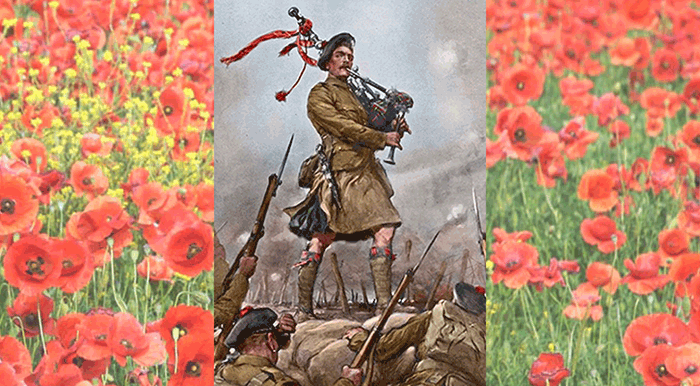
This article is based on a display in the Royal Scots Club in Edinburgh. Thanks to reader David Waterton-Anderson for bringing it to our attention and to the club for their memorial to another WW1 piping hero who would otherwise be forgotten…….
Serving police constable David Anderson, a piper from Dalgety Street, Edinburgh, answered the call of duty when, on the outbreak of WW1, he signed up with the 15th Battalion of the Royal Scots Regiment in October 1914.
Almost two years later, on July 1st 1916, David, then 26, lined up with his fellow soldiers of the 15th on the banks of the Somme river for what was to become the bloodiest battle of the war. By now Pipe Sergeant, David Anderson heard the sound of the whistle to advance.
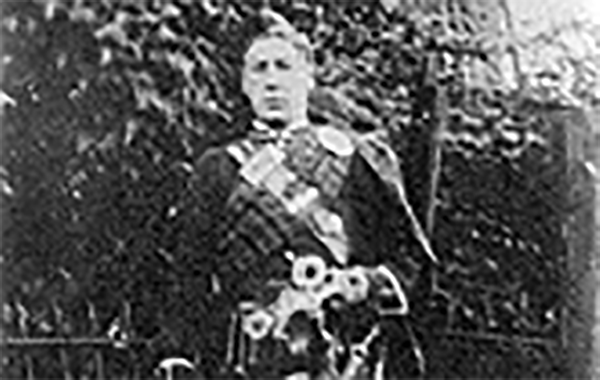
Climbing the steps out of the trench he shouldered his pipes and struck up the regimental march, Dumbarton’s Drums. Leading his company ‘over the top’, he moved forward into a hail of German bullets. On and on he went, piping all the way out into no man’s land.
Other regimental pipers were hit just after going over the top, but David continued to play walking forward through the gunfire and clouds of smoke until, unaccompanied by any of his company, he arrived at an occupied German trench.
His appearance must have startled the German soldiers, who, fearing they were about to be overwhelmed, promptly threw up their hands and surrendered to the unarmed piper.
Soon David was joined by the remainder of his company and together they advanced to a third line of enemy trenches where his luck ran out and he took a round on the right side of his body.
He fell to the ground, stunned and bleeding. After a moment he was able to raise himself to a seated position and, grabbing his muddy bagpipe, continued to encourage his comrades on by playing regimental tunes. Minutes later he was silenced when a bullet passed through his leg.
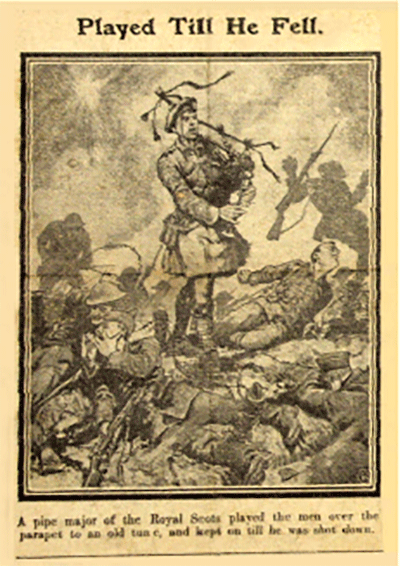
He realised that with this severe injury he needed medical help and, despite the excruciating pain, managed to get to his feet. Almost immediately he was attacked by a German soldier. A fist fight ensued and David succeeded in knocking him unconscious with his bare fists. Then, taking the German’s rifle, he continued fighting until overcome by a loss of blood.
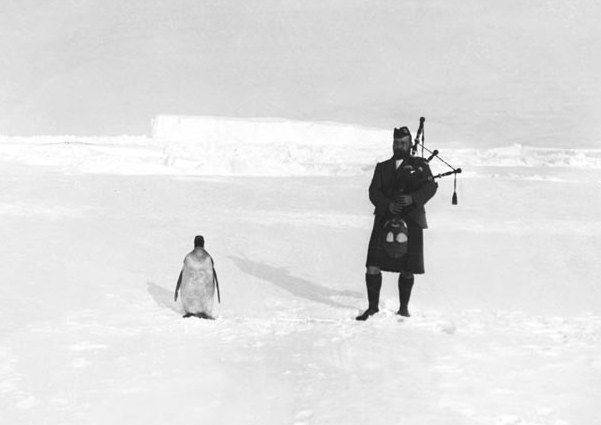
Though his name has not been revered in the same way as other WW1 piping heroes such as Richardson, Findlater, or Laidlaw, all winners of the Victoria Cross, Pipe Sergeant Anderson’s deeds that day displayed remarkable bravery and tenacity in the face of the enemy.
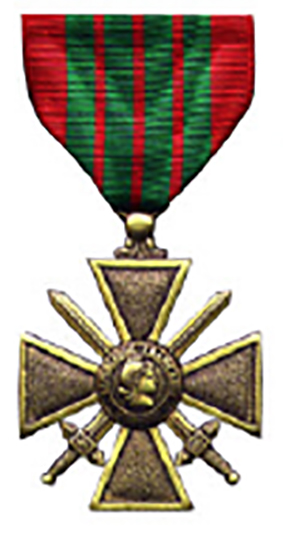
Incredibly he survived his injuries. He received no significant medal from the British authorities but was promoted to Pipe Major. The French were more appreciative, and David’s Croix de Guerre was the only one presented to the 15th battalion for a conspicuous act of bravery.
The Royal Scots Club display ends: ‘History then falls silent on the subject of Pipe Major David Anderson. Where and when he died may be recorded with the Royal Scots in Edinburgh, Scotland, but attempts to obtain
such accounts have yet to bear fruit. What has been preserved is that moment of courage and gallantry.
‘Where so many pipers fought and died…..Pipe Major Anderson fought like a warrior Scot of old………and lived to return to his previous profession in the Edinburgh City Police.’
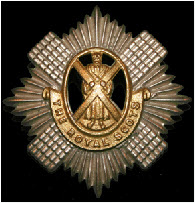
No other single day in history has claimed as many British lives as that first morning of the Somme. After five months of fighting, the forces of the Commonwealth claimed only six miles of ground from the enemy.
















We always wonder where are they now, I mean all the old sets of glory which mark piping history. Dusty attics? Bagpipe collectors? Museums? I suggest a real work on this; it will be very interesting. By the way who was David Anderson’s pipe maker? MacDougall? Glen?
I don’t know what make the pipes were but a report in the Scotsman in October 1916 indicates that the Clan Anderson had presented him with a new set to replace those blown to pieces in the battle.
You can find David Anderson’s police career details here: https://www.scottishpolicemedals.co.uk/scottish-police-officers-who-volunteered-to-serve-in-ww1/edinburgh-city-police-a-division-officers-prior-to-enlistment-circa-1915/
Just scroll down.
David Anderson returned to Edinburgh City Police after the war and continued to play with the ECP Pipe Band for many years.
He retired from the police service in 1945 and passed away around 1967.
Information on the Scottish police medals website indicates that David Anderson died in Edinburgh in 1967 aged 77